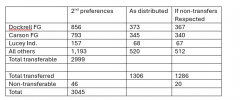Hi Marsupial
In two ways
1) Someone in a political party is more likely to have a surplus than an independent.
2) Typically people who vote 1 FG, vote 2 FG and 3 FG as well.
If someone votes for an independent, their later preferences are more widely distributed.
So it applies to them.
But the fact that it favours the political party is a bit off the point. It does not reflect the intention of the voter, so it is not right.
That's more or less what you wrote in your earlier response!
But I'm not at all convinced by either argument! (Nor by your final sentence!)



